Cat’s Cradle is the fifth book in Rachel’s Suggested Vonnegut Reading Order.
Do you know who James Thurber is? I hope you do. He wrote for The New Yorker way back when most New Yorkers hadn’t heard of it yet. I know him from his sublime picture book Many Moons, which I grew up with, and his short illustrated fairy-tale fables. (If you read one of these and could more or less tell what the artwork was supposed to be, Thurber probably wasn’t the one responsible.) I’m mentioning Thurber because there’s a section in his fairy-tale novella The 13 Clocks that sums up my feelings about Cat’s Cradle better than I can:
Something very much like nothing anyone had ever seen before came trotting down the stairs and crossed the room.
“What is that?” the Duke asked, palely.
“I don’t know what it is,” said Hark, “but it’s the only one there ever was.”
Slaughterhouse-Five may have been Vonnegut’s greatest hit, but Cat’s Cradle was what put him on the map in the first place. When it was first published, in 1963, it was especially popular among college students. The book didn’t sell well, probably because college students were as broke in 1963 as they are now. I can see why ’60s college kids would have liked this book. It’s not like anything anyone’s ever seen, and they surely thought their Greatest-Generation parents – people from the same generation as Kurt Vonnegut – would have hated it.
We know from the beginning of Cat’s Cradle that it’s unique, and that some people will hate it. “Call me Jonah,” our narrator tells us. “My parents did, or nearly did. They called me John.”
What does that mean? Has he changed his name? Or did he just insist in the middle of third grade that everyone start calling him Jonah instead of John? Don’t expect to find out. And don’t expect his name ever to be mentioned again, let alone a last name.
It’s already bizarre, isn’t it?
Anyway, Jonah or John or whoever he’s supposed to be is writing this book in retrospect. He’s now a Bokononist, which means he believes “humanity is organized into teams, teams that do God’s Will without ever discovering what they are doing.” The Books of Bokonon, written by the reclusive founder of the religion, are all about how life is pointless and religion is no help at all. But when the story starts, Jonah-John doesn’t know the first thing, the last thing, or any middle things about Bokononism. He’s writing a book about the end of World War II and collecting information about Dr. Felix Hoenikker, one of the creators of the atomic bomb. His search sends him reeling into a world of midgets, prodigious clarinet players and more prodigious engineers, a far-off island inhabited by Bokononists and the most beautiful woman alive, and ice-nine, a chemical substance with the potential to destroy the world. He juggles all of these developments with great rationality and presence of mind.
I’m kidding. No one wants to read a Vonnegut book that doesn’t star a nutcase. Or that doesn’t have a supporting cast of nutcases. Out of all the Vonnegut books I’ve read, Cat’s Cradle is the most nutcase-ridden of them all.
Here are another few crazy, nutcase-y things about this book:
- Bokononism has its own set of religious terms. There are karasses, or the “teams” of people I mentioned earlier in this post. Sinookas are the tendrils of one’s life, and wampeters are the “pivots,” or central ideas, of karasses.
- The president of San Lorenzo, the island Jonah-John visits, is called “Papa” Monzano, which dwindles into “Papa” as the novel goes on. The word “Papa” is always, without fail, sandwiched between quotation marks.
- Bokononists bond emotionally with each other by rubbing the soles of their feet together – which, if you think about it, is actually remarkably intimate.
- Hazel, a woman Jonah-John meets on his travels, is obsessed with Hoosiers. She exclaims over each one she meets and tells them why they’re better than everybody else.
I’m not sure the chaos and absurdity of the book is to my taste, but I did enjoy reading it, mostly because Vonnegut’s writing is always so good. Dr. Felix Hoenikker was a sorry excuse for a person, but he did have a nice way of looking at things sometimes. This is his recipient speech for the Nobel Prize: “’Ladies and Gentlemen. I stand before you now because I never stopped dawdling like an eight-year-old on a spring morning on his way to school. Anything can make me stop and look and wonder, and sometimes learn. I am a very happy man. Thank you.’”
And then there’s this hilarious exchange between Jonah-John and Philip Castle, also an author:
“I’m not a drug salesman. I’m a writer.”
“What makes you think a writer isn’t a drug salesman?”
“I’ll accept that. Guilty as charged.”
Emma’s Overall Reaction: It’s not love. But I’d go on a couple of dates with it.

If you would like to buy this drug of Kurt Vonnegut’s, visit this link.



